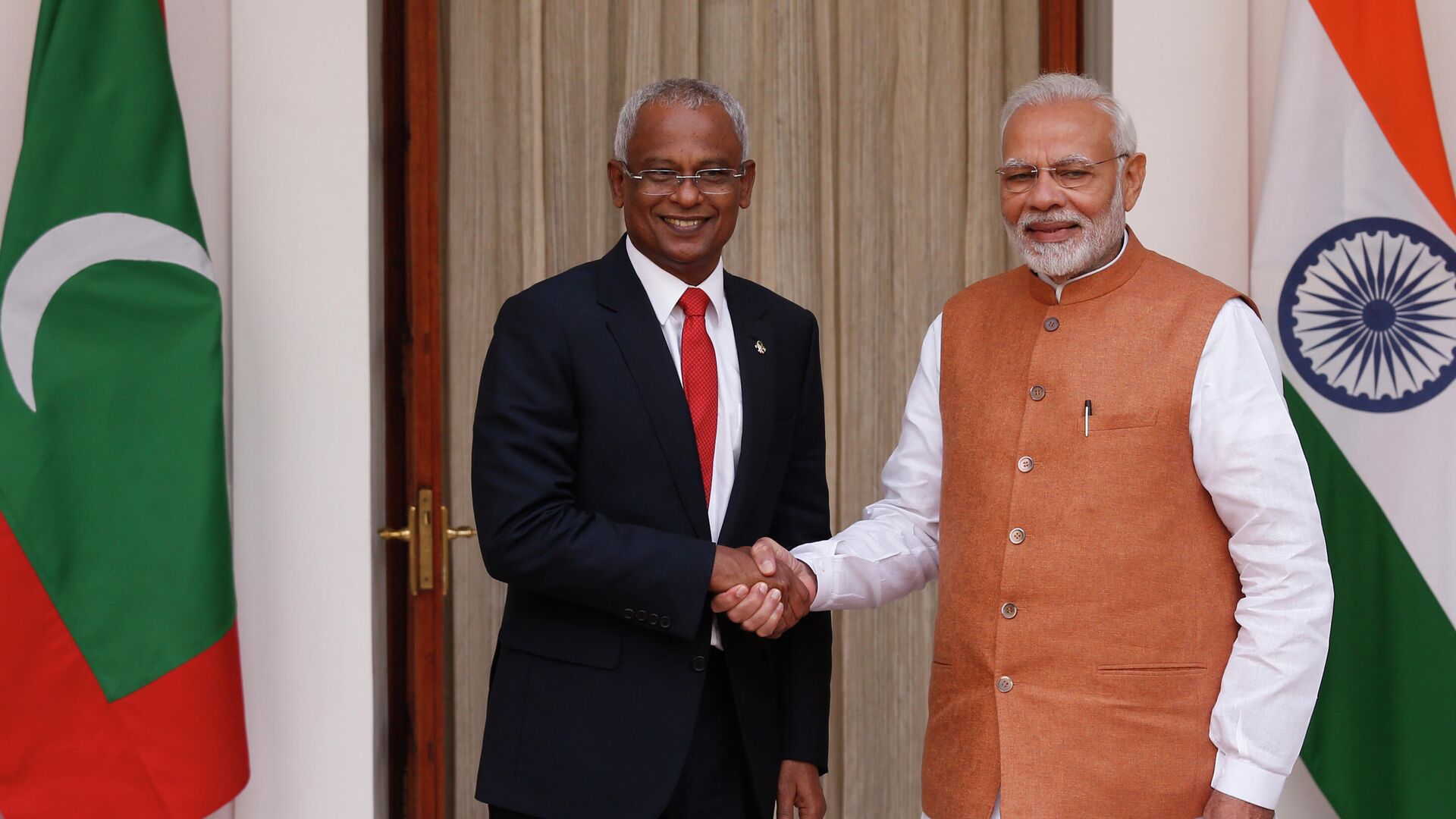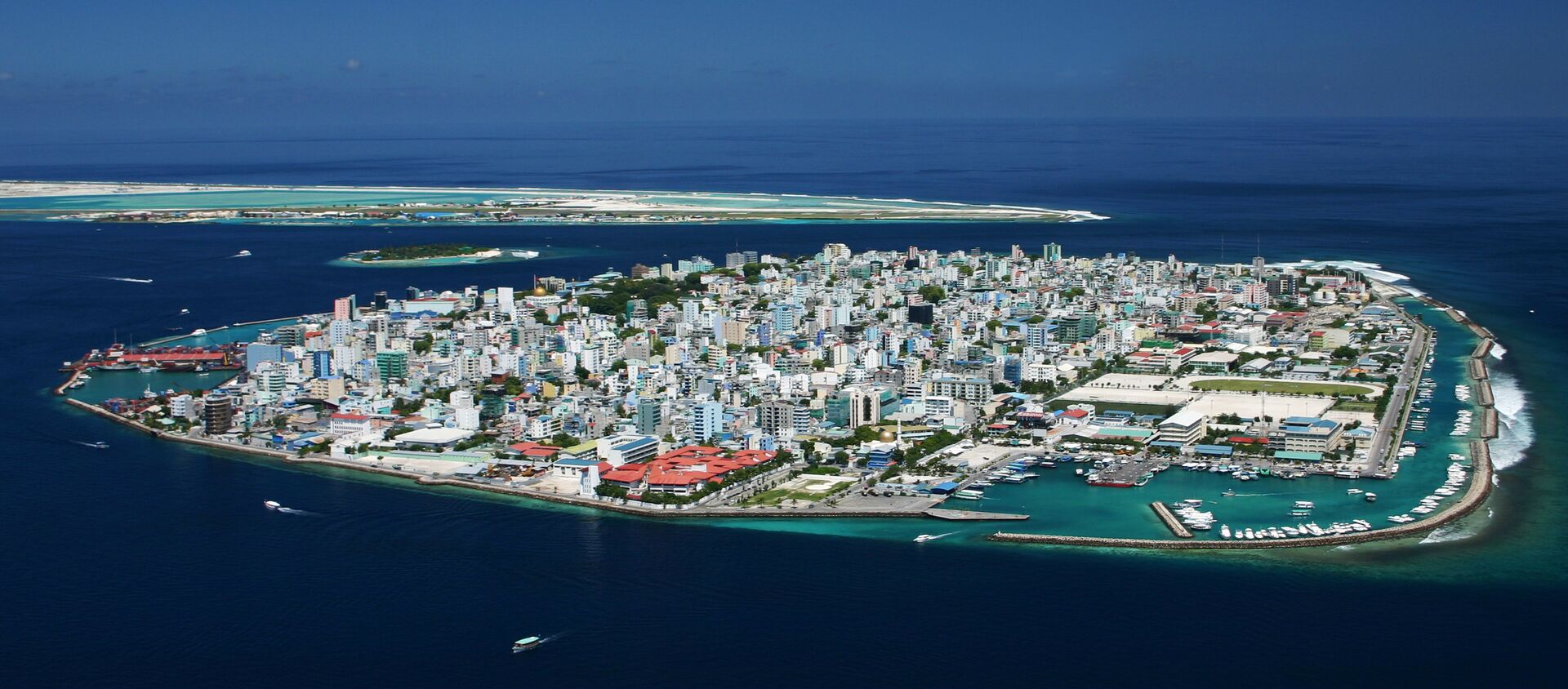Opposition Parties in Maldives Join Hands in Calling For End to Indian Military Presence

© AP Photo / Manish Swarup
Subscribe
The Maldives have emerged as another front for India-China rivalry in the South Asian region, with the ruling Maldives Democratic Party (MDP) often being accused of favouring closer defence and economic ties with New Delhi than its predecessor. However, MDP’s political development has been facing a coordinated pushback from opposition parties.
Opposition parties in the Maldives, a strategic archipelago of over 1,000 islands located in the Indian Ocean, have joined hands to demand an end to the Indian military presence in the country, a press release stated on Sunday.
“Maldives Revolutionary Movement is officially in existence now… Our primary focus is to call for the removal of all foreign military personnel from the Maldives’ soil and the government make public all secret and unconstitutional documents signed between High Commissioner of India Sanjay Sudheer and the Minister of Defence Mariya Didi,” stated the release.
We have succesfully launched the Maldives Revolutionary Movement. In this connection I have released our first official Press Release @ibusolih @MohamedNasheed @MariyaDidi @MNDF_Official @mvpeoplesmajlis @MoFAmv @cnni @BBCBreaking @China_Amb_Mdv @mfa_russia @HCIMaldives pic.twitter.com/Y0YHapLacS
— Shuaib Ali 🇲🇻 ❤️ 🇵🇸 (@ShuaibMaldives) October 23, 2021
The new movement is being led by the Progressive Party of Maldives (PPM), the main federal opposition in the Parliament (Majlis). PPM Leader Abdulla Yameen led the country between 2013 and 2018, before being ousted from power in the 2018 election, which culminated in the victory of the Maldives Democratic Party (MDP).
During the anti-India demonstration organised by the opposition in the capital city Male on Friday (22 October), many described the country’s current President Ibrahim Mohamed Solih, Foreign Minister Abdulla Shahid, Speaker of the Parliament Mohamed Nasheed and Defence Minister Mariya as “traitors” for signing secretive deals with India, local media reported.
Public protesting peacefully on the streets of capital city Male' opposing illegal Indian military presence in the Maldives & calling to disclose secret military agreements with India@AJEnglish @BBCWorld @cnni #IndiaMlitaryOut #DefendMaldives @ProgressPartyMV @ndtv @Reuters pic.twitter.com/J6kYUC1aRn
— defend maldives (@DefendMaldives) October 22, 2021
As per The Maldives Journal, the protest was the biggest one held in the country in recent years and the protesters have vowed to hold more such demonstrations in the future.
The protest was held days after the Maldives government refused to share details about an upcoming Uthuru Thila Falhu (UTF) project, as part of which India would help develop the port near Male.
Over the last week or so, protesters have reportedly also held demonstrations at the residence of the Indian High Commissioner, besides mounting a social media campaign against the Indian presence in the country.
According to leaked documents reported in the local media, Indian military personnel would be stationed at the UTF harbour and the upcoming facility would be allowed to be used by Indian troops in the future. The UTF agreement was signed between the two governments during the visit of Indian foreign minister Subrahmanyam Jaishankar to Maldives in February this year.
The MDP government, deemed as being pro-India by the opposition alliance, has denied the claims.
Besides the UTF project, the PPM-led opposition has also been rallying against other military projects that have been/are being developed with Indian assistance in the Maldives.
According to The Maldives Journal, Indian military personnel are present at surveillance and training facilities in the north and southern tips of the island nation.
During a visit to the country in June 2019, Indian Prime Minister Narendra Modi inaugurated the ‘Coastal Surveillance Radar System’, in a boost to New Delhi’s maritime surveillance capacity in the Indian Ocean.
“The two leaders agreed on the importance of maintaining peace and security in the Indian Ocean Region, and to strengthen coordination in enhancing maritime security in the region, through coordinated patrolling and aerial surveillance, exchange of information, and capacity building,” a joint statement by Modi and Solih at the time said.
Ties between India and Maldives have been on the upswing since the election victory of MDP in 2018. Yameen, the former president, faced accusations from the MDP of prioritising Male’s ties to China over India’s, and signed a series of infrastructure deals with Beijing.
Yameen was sentenced to a jail-term on charges of money laundering after MDP came to power. He has accused the MDP of “siding with foreign forces” to put him behind bars, as per a news report.
Maldives Gov’t Defends Indian Presence
The recent protest against the Indian military presence in the Maldives marks an escalation of the ‘India Out’ Campaign, an online and offline criticism of New Delhi’s policies in the region and its warm ties with the current MDP leadership. The India Out campaign was launched by the PPM last year.
In July, the Indian High Commissioner wrote to the Maldives gov’t to ensure the safety of the foreign diplomats after Indian officials posted in the country were targeted in online attacks by demonstrators. In response, the MDP called upon the opposition protesters and individuals behind the campaign to “refrain from dragging in the Maldives’ diplomatic partners and allies into their own political petty vendettas.”
“Such campaigns of hatred carry real security concerns for the safety and security of diplomats in our country,” the statement said.
The MDP has continued to back India in the ongoing demonstrations in the country, with Defence Minister Mariya Didi saying in a pre-recorded message at a security conference on 21 October that ties between the two nations are “closer than ever”.

